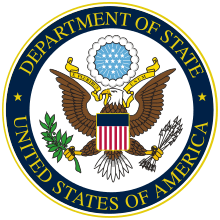George V. Allen
George Venable Allen (November 3, 1903 – July 11, 1970) was a United States diplomat. He served as ambassador to Iran during the crisis of 1946 and was involved in managing US relations amid the Cold War with the Soviet Union. He was involved in expanding activities of the Voice of America, exporting culture and increasing US participation in the UNESCO.
George Venable Allen | |
|---|---|
 1924 Duke University Senior Yearbook Photo | |
| Born | November 3, 1903 |
| Died | July 11, 1970 (aged 66) |
| Alma mater | Duke University |
| Occupation | Diplomat |
| Known for | U.S. Ambassador to Iran, Yugoslavia, India, Nepal, and Greece |
Biography
Born in Durham, North Carolina, son of a merchant Thomas Ellis and Harriet Moore, he attended Duke University—then known as Trinity College—graduating in 1924[1] and from Harvard University in 1929.[2] He worked briefly as a high school teacher between 1924 and 1928 and as a newspaper reporter for the Asheville Times and Durham Herald. He joined Foreign Service in 1930 working first as vice consul in Kingston, Jamaica. He served as U.S. Ambassador to Iran from 1946 to 1948. During this period he worked on preventing a Soviet Iran oil agreement and led to the Iranian prime minister Ahmad Qavam dropping communist cabinet members. He also helped build ties with Shah Mohammed Reza Pahlavi, playing weekly tennis matches with the monarch. He served as Assistant Secretary of State for Public Affairs from 1948 to 1949, U.S. Ambassador to Yugoslavia from 1949 to 1953, United States Ambassador to India and Nepal 1953–1954; while in India he along with Dwight D. Eisenhower supported India's rival Pakistan with military support as a deterrent against Soviet relations with India. He then served as Assistant Secretary of State for Near Eastern, South Asian, and African Affairs from 1953 to 1954, U.S. Ambassador to Greece 1956–1957, and Director of the U.S. Information Agency from 1957 to 1960.[3]
Allen was president of the Tobacco Institute from 1960 to 1966.[4][5]
Allen appeared as himself, while serving as the Director of the Foreign Service Institute, on the February 6, 1967 episode of the game show To Tell the Truth. He received all four votes form the panel.[6]
He married Katherine Martin in 1934 and they had three children. He died at Bahama, North Carolina and was interred in Rock Creek Cemetery in Washington DC.
Notes
- "The Chanticleer [serial]". archive.org. Retrieved 2015-10-18.
- "George V. Allen". nndb.com. Retrieved 2015-10-18.
- Merrill, D. (2000). "Allen, George Venable (1903-1970), diplomat". American National Biography. doi:10.1093/anb/9780198606697.001.0001/anb-9780198606697-e-0700005.
- "George V. Allen, U.S.I.A Director, Named Tobacco Institute President" (Press release). Hill and Knowlton. 1960-11-11. Retrieved 2008-08-02.
- "Former Senator Earle C. Clements Named Tobacco Institute President" (Press release). Tobacco Institute. 1966-02-23. Retrieved 2008-08-02.
- "To Tell the Truth". CBS. Retrieved 27 April 2020.
External links
| Diplomatic posts | ||
|---|---|---|
| Preceded by Wallace Murray |
U.S. Ambassador to Iran 1946–1948 |
Succeeded by John C. Wiley |
| Preceded by Cavendish W. Cannon |
U.S. Ambassador to Yugoslavia 1949–1953 |
Succeeded by James Williams Riddleberger |
| Preceded by Chester Bowles |
U.S. Ambassador to India Also accredited to Nepal 1953–1954 |
Succeeded by John Sherman Cooper |
| Preceded by Cavendish W. Cannon |
U.S. Ambassador to Greece 1956–1957 |
Succeeded by James Williams Riddleberger |
| Government offices | ||
| Preceded by William Benton |
Assistant Secretary of State for Public Affairs March 31, 1948 – November 28, 1949 |
Succeeded by Edward W. Barrett |
| Preceded by Henry A. Byroade |
Assistant Secretary of State for Near Eastern, South Asian, and African Affairs January 26, 1955 – August 27, 1956 |
Succeeded by William M. Rountree |
